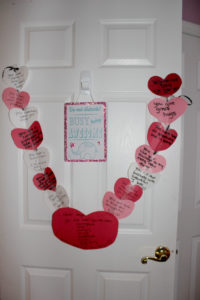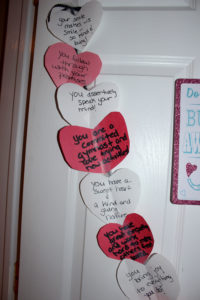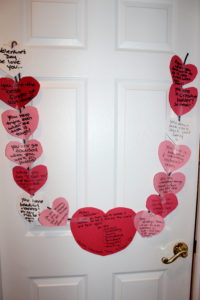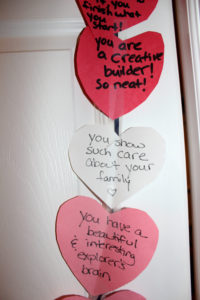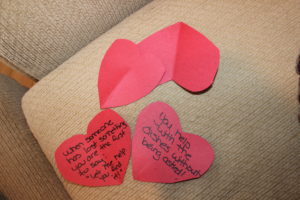How One Child Changed My Perspective about Conversations with Kids
The summer before college, I was in my first year of assistant teaching at a Preschool/DayCare in Livingston NJ. I always loved playing with and working with children- I had been a babysitter for 6 years at that point. I felt pretty good about being the “big sister” to young kids- especially since I was the youngest at home. Teaching allowed me to impart knowledge and work with and talk with kids for several hours a day. But during this summer? I learned something from one child that changed my perspective on talking with children.
I will never forget 4-year-old, “Sasha Washa,” a daughter of a suit-wearing, well quaffed, beautifully-spoken woman who dropped Sasha off each morning before heading off to the company where she worked all day. Sasha had dark brown hair and inquisitive brown eyes that was always taking in what she sees. And I guess hears too. She clearly adopted the language that her mother used at work. Parents and other key adults, often provide the scripts that go into our brains and out our mouths as youngsters.
When Sasha’s friend wouldn’t let her play “house” with the group that was already given roles, she walked up to me and said something I will always remember;
“Excuse me, Miss Robyn? Can we take a meeting?”
A meeting. A meeting is when people share ideas, talk, listen, resolve, compromise and plan.
At that time, I think that my personal understanding of children, especially young ones, was that adults do the teaching. Children do the listening.
In this one sentence (and the countless “meetings” after with children I’ve worked with and my own nieces, nephews and children), I began to regard my interactions with children, even pre-school aged ones, as two-way conversations. It’s important to move from talking “at” children to talking “to” and “with” them.
We want to know:
- What are thinking?
- What are they feeling?
- What do they know?
- What do they want to know?
- What do they want YOU to know?
- What had they seen?
- What had they heard?
- What do they believe?
Conversations are shared. If we are talking “at” a child, they aren’t a participant, they are a target. And with targets, some information is absorbed, other bits bounce off. One voice is heard– although your voice may start to sound like Charlie Brown’s teacher “whaaa, whaaa, whaa, whaaa, whaa.” When someone is engaged in conversation, two voices, multiple opinions, many thoughts, and a host of feelings and beliefs meet and intertwine. We must create a partnership with our children– and in doing so we will all grow, learn and become better.
Of course, gone are days of seen but not heard. And yet, is this reflected in the way that we all talk with children? There are times when we all may find ourselves in a teaching role– but in every conversation, we also must be the student. Take meetings, don’t give soliloquies. You’ll find willing partners who will love to contribute and learn along side of you.


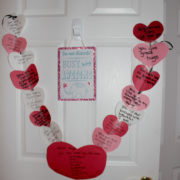
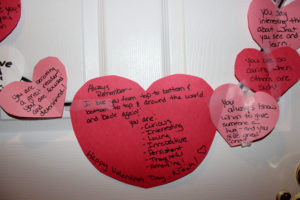 In honor of Valentine’s Day, I saw a few great photos circulating the internet a few weeks back showing how parents can put hearts on their children’s door with cute of funny reasons why they love their kids. I decided to take inspiration from that idea and put hearts on my children’s doors (as you can see throughout this blog post) to recognize their character and praise the actions they take that help others.
In honor of Valentine’s Day, I saw a few great photos circulating the internet a few weeks back showing how parents can put hearts on their children’s door with cute of funny reasons why they love their kids. I decided to take inspiration from that idea and put hearts on my children’s doors (as you can see throughout this blog post) to recognize their character and praise the actions they take that help others.